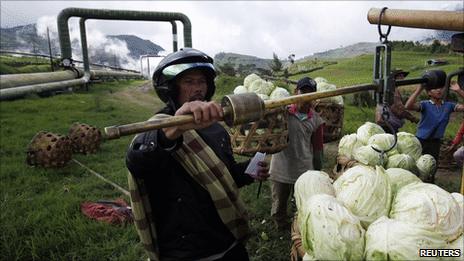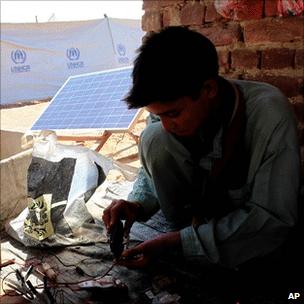Renewables can fuel society, say world climate advisers
- Published

Renewables can provide enough energy to power society, the IPCC concludes
Renewable technologies could supply 80% of the world's energy needs by mid-century, says the Intergovernmental Panel on Climate Change (IPCC).
In a report, external, it says that almost half of current investment in electricity generation is going into renewables.
But growth will depend on having the right policies in place, it says.
The IPCC is charged with providing analysis on climate issues to the world community, and its conclusions have been endorsed by governments.
The summary of its Special Report on Renewable Energy Sources and Climate Change Mitigation (SRREN) was released on Monday following a meeting in Abu Dhabi at which representatives of all IPCC member governments signed off the wording.
"With consistent climate and energy policy support, renewable energy sources can contribute substantially to human well-being by sustainably supplying energy and stabilising the climate," said Professor Ottmar Edenhofer, co-chair of the IPCC working group that produced the report.

Solar energy can make a major contribution in isolated places in poor countries, the IPCC says
"However, the substantial increase of renewables is technically and politically very challenging," he added.
But expansion in renewables is not limited by any notion of a finite supply.
The report concludes there is more than enough to meet the world's current and future energy needs.
"The report clearly demonstrates that renewable technologies could supply the world with more energy than it would ever need, and at a highly competitive cost," said Steve Sawyer, secretary general of the Global Wind Energy Council.
"The IPCC report will be a key reference for policymakers and industry alike, as it represents the most comprehensive high level review of renewable energy to date."
The report analysed 164 "scenarios" of future energy development; and the ones in which renewables were most aggressively pursued resulted in a cut in global greenhouse gas emissions of about one-third compared with business-as-usual projections by 2050.
Policy, briefly
Currently, renewables supply 12.9% of the global energy supply.
However, the biggest single source, accounting for about half of the global total, is the most traditional - the burning of wood for heat and cooking in developing countries.
This is not always truly renewable, as new trees to replace the burned wood are not always planted.
The fastest-growing technology is grid-connected solar electric power, which saw a 53% increase in installed capacity during 2009.
However, the report suggests that solar photovoltaics will continue to be among the more expensive options for some years.
But in situations where there is no grid connection, it and other renewables can be a significant aid to development, contributing to meeting the Millennium Development Goals, the IPCC concludes.
Of the various technologies available, bioenergy is assessed as having the biggest long-term potential for growth, followed by solar and wind power.
Climate changer
However, governments will need to step up policies to stimulate renewable investment if the industries are to grow substantially, it says: business-as-usual will not be enough.
Whether or not governments do so will be a major factor in determining whether international climate targets are met.
"[At UN climate talks] in Cancun, at the end of last year, governments agreed to limit the global average temperature rise to 2C at the most," recalled Christiana Figueres, executive secretary of the UN climate convention (UNFCCC).
"They must reach their goal by making use of renewable energy sources on a very large scale... ambitious national policies and strong international co-operation are together the key to the swift and extensive deployment of renewable energies in all countries."
The Summary for Policymakers agreed in Abu Dhabi gives the top-line conclusions from the full report, compiled by 120 experts, which runs to more than 1,000 pages.
- Published9 May 2011
- Published4 April 2011
- Published15 October 2010